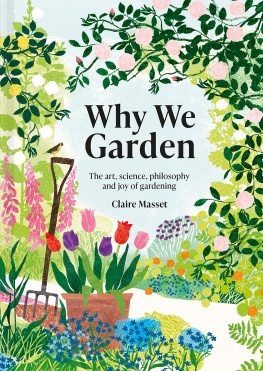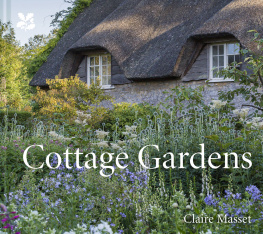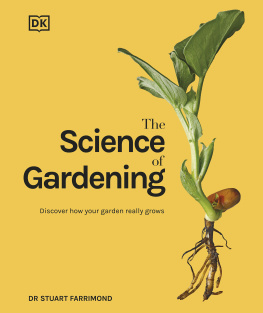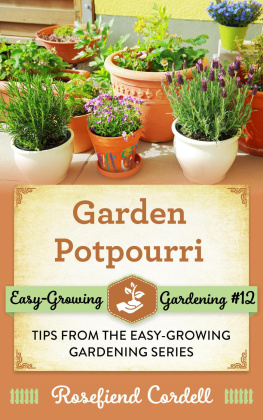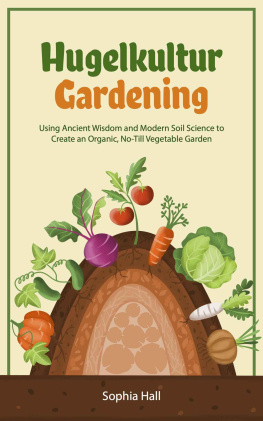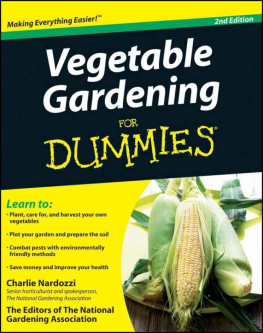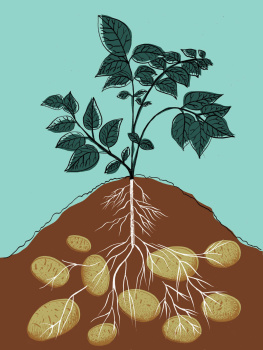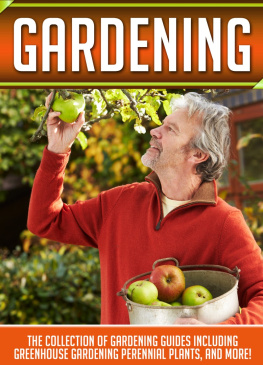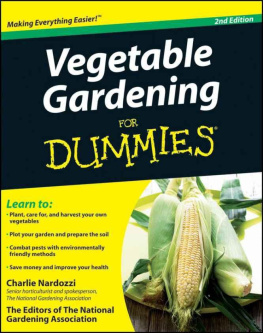Contents
Guide



CONTENTS
INTRODUCTION
There are so many reasons not to garden. Its hard work. Its time-consuming. It can be tediously repetitive. Sometimes its even a little degrading. What other pastime has you on your hands and knees for hours? What is this strange pull that draws us to the soil? Why are we so keen to get our hands dirty? Most of us dont need to garden. We do it because we enjoy it. In fact, we love it so much that like Vita Sackville-West we are willing to suffer and sacrifice for the sake of it.
More and more people are taking up gardening. Even those without gardens. Even those with busy, hectic lives, very little time or money. Even those suffering with physical or mental health problems. This says something about its singular appeal.
I wanted to explore the enigma that is our obsession with growing things: this deep, earthy passion that binds us as human beings; this unbroken thread that connects us to our ancestors. It turns out there is a lot more to gardening than meets the eye. It isnt just about having beautiful flowers or harvesting fruit and veg. Just like the soil on which it relies, gardening is rich and life-giving, in far more ways than the obvious.
Arranged in themed chapters, this book uncovers the many sometimes wonderfully contradictory reasons why people take up gardening and become hooked on it. Within its pages youll meet a varied cast of characters: famous philosophers, artists and writers such as Epicurus, Monet and Orwell; not-so-famous guerrilla gardeners, psychologists and scientists; and everyday gardeners like you and me. Each shines their own brilliant light on the topic.
I have broken my back, my finger-nails, and sometimes my heart, in the practical pursuit of my favourite occupation.
VITA SACKVILLE-WEST
_______
George Orwell once said: Outside my work the thing I care most about is gardening. His diaries show the daily attention he lavished on his plot and reveal, between the lines, something of its grounding effect. I love the fact that this advocate of plain English and documenter of gritty social realities was equally unpretentious in his personal pursuits: a man of the earth, in touch with the fundamentals of life. Gardeners know that there is more joy to be had from a patch of soil than virtually anything else.
Monet became so obsessed with his garden that he spent the last 43 years of his life painting it. He described Giverny as his most beautiful masterpiece. But as well see, beauty was only part of its appeal. Something deeper was at work: a spiritual undertow that can affect all gardeners. Gardens are potent places, rich in symbolism and transformative atmosphere, and the near-alchemy of plant growth places them on the edge of the miraculous.
In Ancient Greece, the philosopher Epicurus named his thinkers community near Athens, The Garden. In this verdant sanctuary, he and his followers found their personal ataraxia, or peace of mind. Its something we modern-day gardeners can relate to. Whatever the size of your plot, no space is too small, or indeed too challenging, to become an oasis of peace and plants perhaps the closest thing to heaven you will experience. Consider, for instance, the artist Hester Mallin, who turned her balcony on the 23rd floor of a tower block in East London into a plant-packed paradise, filled with over 100 different specimens. It was her very own country garden, 70 metres in the sky.
I have at times sheepishly peppered the book with my own experiences in the hope that my little horticultural epiphanies will chime with yours. Gardening is often solitary work, and yet its simple practice connects us to a worldwide community of plant lovers. In this divisive world, it is a bond worth cherishing. As gardeners, we can be thankful for having something that answers so many of our deep human needs: the need for inspiration, beauty, nature, refreshment, exercise, solace, connection, hope, and so much more. And, just like life, gardening is filled with exciting contradictions. It is both enriching and humbling, freeing and enslaving, quieting and stimulating, consoling and heart-breaking. How could it ever be boring?
Research now proves what we have sensed for hundreds if not thousands of years: gardening helps us lead happier and healthier lives. Increasingly through volunteer-run projects such as community gardens and mental-health charities it is becoming a force for social and environmental change. Once a benign Sunday-afternoon pursuit, gardening is now helping to create a better world. We are becoming garden activists. We are saying no to peat, chemical weedkillers and harmful pesticides. We are swapping seeds and saving water. Some of us are planting up previously barren spaces where nature and people can thrive.
Mirabel Osler, one of the most perceptive garden writers whose words I have shamelessly quoted throughout this book, once posed the question: Why garden? In jest, she replied: God knows. This is my humble attempt at a slightly longer answer.

I must have flowers, always, and always.
CLAUDE MONET
_______
Monet didnt have just any flowers though; his artists eye and horticultural knowledge told him which plants to select and where to put them to create a garden which was, quite simply, beautiful.
Isnt that what all gardeners want a mini Giverny? Not a smaller, facsimile version, but what it represents: a satisfying creative endeavour, a visual delight. Monet, the ultimate artist-gardener, loved his garden perhaps even more than his painting. For the last 43 years of his life, it was his inspiration, his joy, his world. But it was also, he confessed, his most beautiful masterpiece.
Our natural desire to create beauty is nowhere better served than in a garden, and this is despite gardenings many challenges. It is the most difficult art to get right. To be successful, you need to create a complete experience: one that you can look at, like a painting, but also walk around. A garden is a space you inhabit. It envelops you, not just with its physical boundaries, but with its spirit a distinct nature incorporating movement, light and sound, which the gardener has helped to fashion. There are other difficulties too, from the vagaries of the weather and the threat of disease, to the fact that gardens are ever-changing and therefore never complete.
Thankfully, gardening is also the most forgiving art. Nature will always be more or less beautiful, whichever way you choose to mix its jewels. Unlike the painter, you are not creating something out of (virtually) nothing. A gardeners palette is already furnished with ready-made works of natural art.
According to the grande dame of gardening, Gertrude Jekyll, sometimes all it takes is to show some delightful colour-combination without regard to the other considerations that go to the making of a more ambitious picture (

